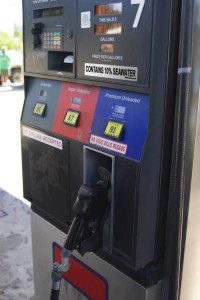This post may contain affiliate links. See my disclosure policy for more details.
Source: Esurance
Gas prices are quite high again, and summer means road-trips, weekend excursions, etc. Here are a handful of tips from Esurance that will help you get the most out of your car, for the least amount of money:
- Drive Less – It’s good for you, the environment, and your car
*Walk, bike, or roller blade to make short trips in your neighborhood! It’s healthier for you, your pocketbook, and the planet.
*Start a carpool with your coworkers to relieve the expense and stress of long commutes.
*Use public transportation; try taking the bus, subway, or train to work. You’ll get your summer reading in! - Drive Smart – Increase your gas milage
*Clean out your trunk. Drop off those miscellaneous things and increase your fuel efficiency!
*Use your car’s overdrive at high speeds (found on 5-speed manual transmissions and some 4-speed automatic transmissions). Overdrive allows the engine to operate at a lower rpm for a given road speed.
*Accelerate and break slowly. Both actions save fuel.
*Turn off your engine when you’re trapped in a long line or waiting somewhere. Idling wastes much more gas then restarting your car.
*Roll up your windows and use your air vents. Driving with your windows up reduces the amount of drag on your vehicle, increasing engine efficiency. - Drive Slower – Ease off the gas pedal and save gas
*Increase your gas mileage by up to 15 percent by traveling at 55, rather than 65 miles per hour. According to The Union of Concerned Scientists, dropping from 70 to 60 mph improves fuel efficiency by an average of 17.2 percent, while dropping from 75 to 55 improves fuel efficiency by 30.6 percent! Time is not exactly money. On a 300-mile trip, driving 70 instead of 65 mph would only save you 20 minutes. - Drive a Fuel-Efficient Vehicle?
*Chose a more fuel-efficient vehicle the next time you’re car shopping (or if you’re a two car family, take out the more efficient one!). You could save hundreds of dollars a year on gas. Every gallon of gas your vehicle burns puts 20 pounds of carbon dioxide into the air. Just think— a car that gets 25 miles to the gallon will produce about 15 tons less carbon dioxide in its lifetime than a car that gets 20 miles to the gallon. To find out which vehicles are the most fuel-efficient, check out these resources: https://www.fueleconomy.gov + https://www.edmunds.com - Drive a Fine-Tuned Machine – Increase your engine’s performance
*Get your car serviced regularly with special attention to your fuel, ignition, or emission control systems.
*Change your oil and your oil filters regularly; keep tabs on your transmission fluid. Oil and transmission fluid help your engine run smoothly.
*Replace worn spark plugs and bad brakes. Both can contribute to lower gas mileage.
*Make sure that your tires are properly inflated and aligned for better performance. Check your owner’s manual for specific tire pressure and rotation recommendations.





